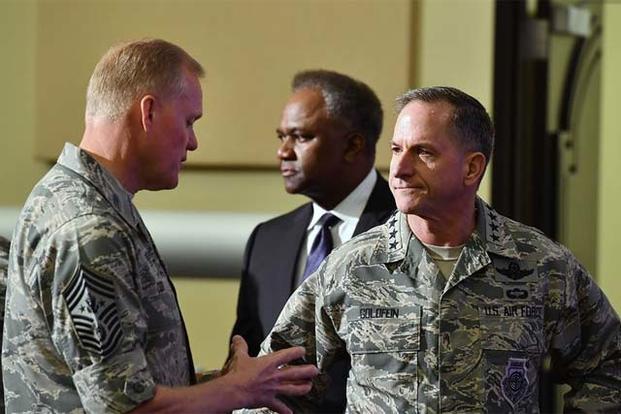The U.S. Air Force's top officer said he expects the high pace of war-related operations to continue for decades to come.
"We've been deploying now for 15 years," Chief of Staff Gen. David Goldfein said. "We've probably got 15, 20 years to go."
His comments came Wednesday at Joint Base Andrews, Maryland, during a spouse and family forum hosted by Air Force Secretary Deborah Lee James.
While fewer airmen are deploying, the time they spend away is increasing -- driven in part by missions related to the air war against the Islamic State in Iraq and Syria, or ISIS, a resurgent Russia and China's increased military activity in the Pacific.
Rising Deployment Times
On average, enlisted airmen deployed for 132 days and officers for 128 days in 2015, up from 110 days and 93 days, respectively, in 2013, according to an analysis by Air Force Times.
Goldfein last month announced an initiative to deploy airmen in teams of three or more, rather than dispatching them individually.
"I'm concerned that over the past 15 years, we have migrated into sending too many single airmen into combat," Goldfein said at the time. "While we will never be the service that says, if you want an airman, you get an entire squadron -- because that's not what the nation needs, we need to be a little more flexible than that -- I think the pendulum has swung a little too much to individual airmen."
Continued deployment demands put pressure on the Air Force's goal of a 1:2 deploy-to-dwell time, or six months deployed and one year at home. In 2015, no career fields increased from the 1:2 mark, with all but six keeping rates of 1:3 or lower, according to Air Force Times.
Family Programs
Goldfein asked a panel of military family advocates how efforts such as the Exceptional Family Member Program are catering to families when loved ones are deployed.
"Is there anything in our system that actually reaches out to a deployed spouse, or is a deployed spouse really looking at the exact same process as a couple that's together?" he said.
Air Force Lt. Col. Andy Cruz, the 14th Medical Group deputy commander, responded, "I know from a base level that the key spouse program at the base I just came from works along with the airmen, family readiness center ... to develop different programs monthly. "
Panel member Dr. Ed Tyner, deputy director of the Defense Department's special needs program, said, "At our level at OSD, we've done several trainings on doing warm handoffs," using the term to describe when a primary care provider personally introduces a patient to a behavioral health specialist. "But again, it's probably only going to be if the family member comes in and asks for it, because they won't always know [the program exists]," he said.
-- Amy Bushatz contributed to this report.
-- Oriana Pawlyk can be reached at oriana.pawlyk@military.com. Follow her on Twitter at @Oriana0214.





























